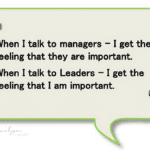There’s been some debate lately about being nice and likable as a competency. Not being one to shy away from a good debate, I have something to say about this topic…
I kinda view “nice” and “likable” as the same thing. So, while being nice is … well, um … nice, I don’t believe being likable is a key competency. As a business person, there are plenty of attributes I’d put above nice and likable on the competency spectrum.
One of them is honest. I’ve seen plenty of people who are nice but no one believes a word they say. Reminds me of the term, “all flash and no substance.” I’ve said this before: you can be forgiven for a lot of things but once you lose a person’s trust, I’m not sure you can ever get it back. On the other hand, I’ve known plenty of people who are direct, brash, and maybe even some days a real jerk … but I never questioned their honesty. People might find dealing with them completely exasperating and might disagree with their methods, but people knew where they stood and didn’t question their motives or intent.
Another one is results-oriented. There’s something to be said about people who get things done (think Bill Clinton). If you’re nice and people like you but you don’t accomplish squat, I’m not sure how that translates into a long and successful career. And, if everyone in your organization is “nice” but you don’t hit your goals, well…I’m not sure you’ll be in business very long.
Don’t get me wrong. I’m not endorsing pure evil. But let’s face it…some people hide behind nice instead of having a tough conversation or making a difficult decision. Why does that happen? Maybe it’s because when people have those tough conversations, they’re labeled “not nice” because it’s easier to blame the messenger than hold ourselves accountable.
Sure, in an ideal world, we all want everyone we deal with to be honest, results-oriented, and nice. But, if all you can do in this world is be nice, what happens when that doesn’t get the job done?
I’d like to hear what you think on this. Let me know in the comments below.
1







Jennifer V. Miller says
I, too, have followed this notion through the blogsphere over the past few weeks. As a leadership competency, there are many words I’d chose above “kindness”. There’s a book called “Leading with Kindess” that seems to be prompting some of the buzz. I haven’t read the book; perhaps it’s fantastic and filled with amazing insights. It just seems to me that the word “kindess” was put on the front cover to get people to crack open the book.
Attributes that ARE relevent are things like compassion, empathy and emotional resilience. These are key leadership competencies that are in the “touchy feely” realm, yet are true differentiators in the leadership skillset. I’d put those in front of anything that connotes “niceness” or “kindess”.
Puf says
Sharlyn, thanks for the link back, much appreciated.
You hit the nail on the head when you brought up honesty, for some reason, I think many people assume that being dishonest (even little white lies) save peoples feelings. I call Bravo Sierra on that!
Joan E. Ginsberg says
Such an interesting post, Sharlyn!
I’m a big Broadway musical fan, and your post reminded me about a song from a show that essentially said the same thing. The song said that there is a difference between “nice” and “good”. Good, in the song, meant doing the right thing and being honest about it, even if it meant sacrificing some niceties to get there.
Being nice (or likable) certainly makes things easier, but not necessarily better.
Count me in the at-the-moment majority (rare for me!) 🙂
tlcolson says
I’ve worked with companies that wanted “nice and likable” – and I’ve always preferred “gets things done, in the most polite manner possible” Sometimes nice doesn’t accomplish the goal. I want to see professionalism, but not “false/fake” – which is what I think of when someone describes an individual as “nice”. I usually get the impression there’s no “there” there.
adowling says
I think it depends on the level of nice. You know you have those people that are overly nice and cant say no to anyone. Those are the people we dont need. One can be nice and still be able to get the job done. Like @tlcolson said above “get things accompished in the most polite manner possible”. When it gets to the point were being nice affects the ability to get the job done, be it either because they cant say no or dont want to hurt someones feelings, those people need to be moved out of the way. Sometimes you have to be forceful even it means coming across as not being nice. On the honesty part, I would rather someone tell me the truth any day than have someone lie to me because they dont want to mean, in business or personal life.
Lance Haun says
Great post per usual.
My feeling is that being nice and being likable are two different things. Being nice is more of a personal attitude and action set that drives perception whereas being likable is simply driving a perception. Does that even make sense? Like how all squares (nice people) are rectangles (likable people) but rectangles (likable people) are not always squares (nice people). And before anyone puts words in my mouth, I don’t think nice people are squares 🙂
Now I don’t put being likable over being honest or being results oriented. I do think it is a skill that one can hone and use to his or her advantage in business though. It doesn’t mean you’re a pushover though. It means you’re generally pleasant to work with and it gains some credibility when you do have to pull out a clue by four because you don’t use force as your sole persuasion technique.
Michael VanDervort says
Having recently been dubbed “The Witzerland of HR Bloggers” by @Stelzner, I subscribe to the theory that you can be competent, deliver timely and effective results, and still be likable. It doesn’t require being perky or chatty, just respectful, attentive and understanding while doing what needs to get done.
Doesn’t a personal touch always deliver a little extra in the customer service experience?
Michael VanDervort says
That would be the “Switzerland of HR Bloggers” !
Andrea says
Just came across you blog, and at first glance I like what I see! Very great points made in this post. I like to think of one of my core competencies as “nice,” but sometimes nice doesn’t get you far in the business world (or, from another perspective, sometimes it doesn’t get your business far). To thcolson’s point above, getting things done (ie, productive?) is often a much better quality to possess and promote. I do think it’s possible to be both nice and productive, but I’d rather see someone lead with a clear objective in mind, and sometimes that doesn’t always involve being nice. However, i think the ideal leader leads with positiveness, a key characteristic to being productive.
Thanks for sharing your views, I look forward to reading more!
-Andrea, @AndreaNowack
hr bartender says
Muchas gracias to everyone for their comments! Absolutely . . . in a perfect world, it would be wonderful to possess all of the qualities mentioned, but in reality that’s a pretty tall order. Which begs the initial thought of where does being nice fit in relative to other leadership competencies.
Lance’s comment has given me something to ponder…are nice and likability two different things? Hmmm…might be something for a future post.
Ann Bares says
Sharlyn:
I have always appreciated the following quote on niceness from Malcolm Gladwell…
It [is] the practice of niceness that [helps] keep other values, such as fairness, at bay. Fairness sometimes requires that surfaces be disturbed, that patterns of cordiality be broken, and that people rudely or abruptly be removed from their place. Niceness is the enemy of fairness.
Food for thought!
Marty Bryson says
I am currently reading a book Captializing on Kindness by Kristin Tillquist that is based on the philosophy that “being nice” is a key component of being successful. It discusses the urban myth that business minds must choose between being kind and being successful. She defines Kindness as reputation, reciprocity, personality, thanks and connecting. Check out her website at http://www.kindnesscapital.com.
Maria Weyman says
Great topic
working girl says
Funny, I was just thinking you don’t have to like your boss but you need to respect them. So I’ll take competent over nice any day!
goldwingbartndr says
Any good martial arts school can teach the life principals required to be a good citizen. Compassion, Cooperation, Appreciation, Self Control, Honesty, Integrity…
But how can anything so scarce can be called “Common Sense”?
Kris says
I don’t see anything here regarding gender differences. Research has shown that women are disproportionately punished if not perceived as “nice.” They are less successful if forthright and direct. Anything to say on this?
Sharlyn Lauby says
Interesting thought. Thanks for commenting Kris. Lance Haun, author of Rehaul blog, wrote a great guest piece here about his views on nice and likable being two different things. You might want to check it out.
http://www.hrbartender.com/2009/employee/being-likable-isnt-nice-and-other-subtle-manipulations/
Candice Arnold says
I read this post and Lance Haun’s guest post back in 2009 when you first wrote them. I, then, proceeded to write a series of articles based on the responses I got from a query I posted on HARO. I started thinking about it again for another article that I want to write about the same subject. The reason it fascinates me so much is because I believe that it is entirely possible for a person to be both nice and likable.
Being straightforward isn’t necessarily “not nice.” You can be a no nonsense supervisor or manager who also employs tact, compassion and understanding. Oprah Winfrey, for instance, is often referred to as nice. But I’ll bet she’s straightforward with people when necessary.
As Haun said, nice is a character trait and likability is a skill. The fact that likability can be taught, doesn’t automatically mean that likable people are phonies who turn charm on and off at will. For some people, being likable is a part of their character makeup. It’s just the way they are.
I have to agree with Kris that women get maligned when they exhibit strength in the workplace. Martha Stewart, for example, might not be referred to as nice, but she certainly seems likable. Some people have called her something of the five-letter variety, which comes as no surprise.
Although the two words aren’t necessarily synonymous, they’re not necessarily mutually exclusive either.
Sharlyn Lauby says
Thanks for the comment Candice. I agree that the terms aren’t synonymous or mutually exclusive. What prompted me to write the post in the first place was a comment about being nice as a leadership competency.
I believe there’s an expectation that our leaders will be effective. So what happens if you have a leader who’s nice but ineffective? The leader has to change their behavior to become effective. Sometimes along the way, people perceive that as no longer being nice. And can subsequently lose the likability factor.
We’re drawing distinctions between nice and likable. I wonder how many people do that. Or how many say, “I like you because you’re nice.”